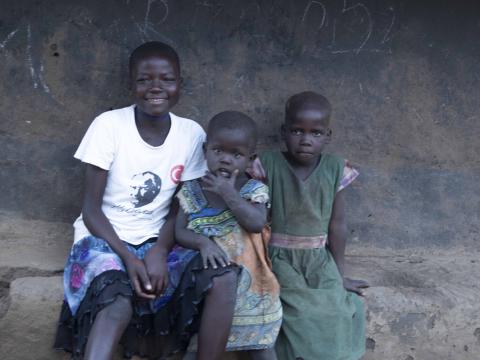Keep the promise – Create an inclusive and safe world for our girls

By Irene Kagoya, Associate Director of Advocacy, World Vision in Uganda
Imagine coming into a world where you are received with mixed feelings, where you are boxed into people’s mindsets & culture, where you have to work twice as hard to excel, where you struggle to beat the odds in order to make it up the ladder …this is the reality of many girls in the world
Girls in Uganda and many parts of the World are still discriminated against based on their gender; discrimination that for so many girls stems right from birth. Unfortunately, in Uganda it is not strange that when a girl is born she is associated with being a source of wealth. In fact, many tribes in the central and eastern regions will say “Azadde kasukali” (She has given birth to wealth).
Where the parents have been economically pressed for survival, the girl child is often the 'sacrificial lamb'; her adolescence given away in exchange for bride price. It is therefore not surprising that a World Vision report predicts a sharp increase in violence against children and child marriage, with at least four million more girls predicted to be married in the next two years, as a result of the COVID-19 pandemic.
On the 11th of October, Uganda joined the rest of the world to commemorate the International Day of the Girl under the theme “My Voice Our Equal Future”. According to the United Nations Children’s Fund (UNICEF), this year’s theme presents an opportunity to re-imagine a better world inspired by adolescent girls- energised and recognised, counted and invested in.
The call to re-imagine a better world is critical especially at a time when the world is faced with a global pandemic that is threatening to reverse these gains. Like in many countries, the outbreak of COVID-19 has worsened the situation of vulnerable girls in Uganda. It is heartbreaking to hear that 6,000 girls in Moroto alone became pregnant during the lockdown. The situation is not any better in refugee settlements with the rise in cases of defilement and teenage pregnancies. Girls are shouldering the greatest burden of care work in many homes at the expense of study time.
The government needs to address existing gaps in the policies and laws on child protection. While the law prohibits child marriages, there is no criminal liability for it. Parliament needs to fast-track the passing of the sexual offences bill which among other offences criminalises marriages involving children. We also hope the tabled National Strategy on Ending Child Marriage and Teenage pregnancy will be completed by the Ministry of Gender Labor and Social Development.
As parents/guardians, the care of children is our primary duty in this world. It is the only job we happily embrace for zero pay. Now that children are at home with a few candidate classes going back to school since the 15th of October, we must be vigilant, and work out ways of ensuring that our girls are safe, fully informed and make the right decisions about their lives.
Most children are still battling different forms of child abuse. We should never be seen to be the enemy of our children, let us make peace in the home. A home must be the safest place for any child in this world; let us not take away the saying “there is no place like home.”
The International Day of the Girl should be a reminder to each girl that she has a right to safety, and empower them to speak out against any activities that might expose them to abuse. The Government instituted the Sauti Helpline ‘116’, which girls should use this to call out for help or talk to their parent/guardians about the challenges they are facing. Always break the silence and Let your NO be a NO!
World Vision has been running the 'It Takes Uganda to End Violence against Children' campaign in Uganda since 2017. Through this campaign, we have seen children use their power to transform themselves and the lives of their peers. Therefore, as we continue to reflect on the theme of International Day of the Girl, let us reflect on how each one of us can support girls to become better agents of change in their homes, schools and the communities where they live.
It takes a world to end violence against children. Together, let us secure her voice and equal future today.